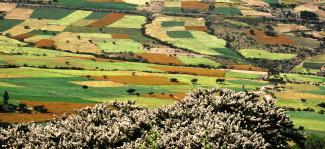OVERVIEW
In Ethiopia, severely degraded ecosystems, agricultural and pasture lands, and poorly utilized water resources have exacerbated poverty, food insecurity, and loss of biodiversity, and even aggravated conflict. By incorporating environmental issues into USAID’s work in Ethiopia, we strive to promote sustainable development, livelihood resilience, and disaster readiness. In 2021, as part of Ethiopia's updated Nationally Determined Contribution under the Paris Agreement, the Government of Ethiopia announced ambitious emissions cuts for 2030. Among commitments, there are plans to reduce emissions by 68 percent and reforest and restore up to 15 million hectares of trees.
USAID supports Ethiopia’s development and climate priorities through a series of interlinked activities and partnerships. We partner with communities across the country to promote soil and water conservation, protecting critical watersheds and promoting the sustainable use of water resources. By using innovative technologies, USAID forecasts weather patterns to predict potential droughts to improve food security. For the pastoral and agricultural sectors, we partner with local communities to improve land management. Supporting the disaster risk management of communities across the country is key. This includes investment in climate resilient livelihoods, to improve their adaptation to climate shocks. Overall, these investments improve food security for millions of the most vulnerable throughout the country. In addition, USAID promotes sustainable forest, agricultural, and community land management to address the causes of land use change, promote sustainable livelihoods, and increase the effectiveness of environmental policies. Protecting forests and other ecosystems sustains livelihoods, mitigates climate change risks, and provides environmental interventions such as biodiversity preservation, carbon capture, and water purification.
PRIORITIES
Feed the Future Ethiopia Livelihoods for Resilience supports communities in rehabilitating and improving management of watersheds and other natural resources to enhance irrigation and year-round access to water sources. This helps these communities weather the effects of recurring droughts and maximize their land use for harvesting crops.
The Feed the Future Ethiopia Land Governance Activity builds on USAID's substantial past investments to improve land governance and land administration, and strengthens land tenure rights in Ethiopia to promote economic growth, increase agricultural productivity, and reduce conflict and resource degradation.
Feed the Future Ethiopia Resilience in Pastoral Areas aims to increase climate resilient growth in the lowlands of Ethiopia by promoting livelihood diversification, improving sustainable rangeland management, enhancing local use of national meteorological information, and piloting weather-based livestock insurance products. Resilience in Pastoral Areas South is also working with South Pole to develop one of the largest grassland-based carbon projects in the world, with the intent of regenerating grasses across 1.4 million hectares of grazing land that will create verified carbon units with revenue benefiting communities well beyond the project period.
Through the Famine Early Warning Systems Network (FEWS NET) activity, we are helping to predict and plan ways to decrease the use of natural resources during times of economic and food distress, when people tend to increasingly depend on these resources for survival.
Biodiversity and Community Resilience in the Omo Valley (BIOM) will support Indigenous Peoples to establish and sustainably manage a Community Conservation Area between the Omo and Mago National Parks in partnership with private sector ecotourism investors. This activity will address the root causes of biodiversity loss and empower Indigenous Peoples communities to advocate for themselves with local and regional governments.

